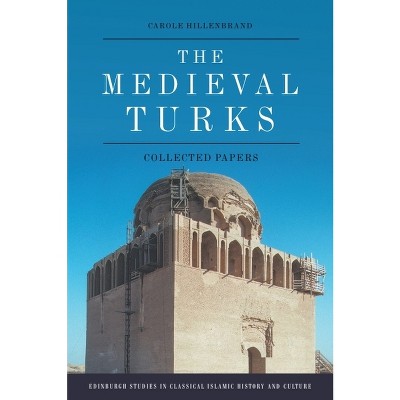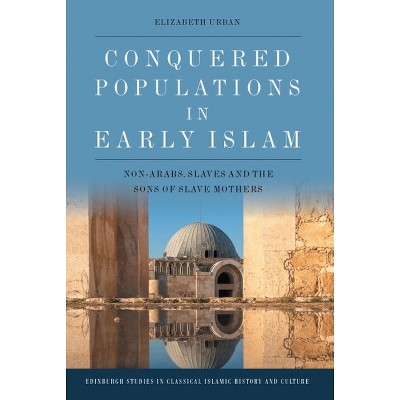The Administration of Justice in Medieval Egypt - (Edinburgh Studies in Classical Islamic History and Culture) by Yaacov Lev (Paperback)

About this item
Highlights
- This book shows how political and administrative forces shaped the way justice was applied in medieval Egypt.
- About the Author: Yaacov Lev is Professor (Emeritus) in Middle Eastern Studies at Bar Ilan University, Israel.
- 312 Pages
- History, Middle East
- Series Name: Edinburgh Studies in Classical Islamic History and Culture
Description
About the Book
This book shows how political and administrative forces shaped the way justice was applied in medieval Egypt. It introduces the model that evolved during the 7th to the 9th centuries, which involved 4 judicial institutions: the cadi, the court of complaint, the police/shurta and the Islamized market law.
Book Synopsis
This book shows how political and administrative forces shaped the way justice was applied in medieval Egypt. It introduces the model that evolved during the 7th to the 9th centuries, which involved four judicial institutions: the cadi, the court of complaint (mazalim), the police/shurta (responsible for criminal justice) and the Islamized market law (hisba) administrated by the market supervisor/muhtasib.
Literary and non-literary sources are used to highlight how these institutions worked in real-time situations such as the famine of 1024-1025, which posed tremendous challenges to the market supervisors in Cairo. The inner workings of the court of complaint during the 11th-12th century Fatimid state are revealed through array of documentary sources. Further, non-Muslim communities, their courts and their sphere of responsibilities are treated as integral to how justice was dispensed in medieval Islam. Documentary sources offers significant insights into these issues and illuminate the scope and limits of non-Muslims self-rule/judicial autonomy.
In sum, the book shows that the administrative and political history of the judiciary in medieval Egypt implicitly and explicitly illuminates broader questions about religious and social forces that shaped the lives of medieval people in the Middle East, Muslims and non-Muslims alike.
From the Back Cover
Explores how Muslim law governed the lives of individuals and the conduct of society in medieval Egypt This book shows how political and administrative forces shaped the way justice was applied in medieval Egypt. It introduces the model that evolved during the 7th to the 12th centuries, which involved four judicial institutions: the cadi; the mazalim (court of complaint); the police/shurta (responsible for criminal justice); and the hisba (Islamised market law) administrated by the muhtasib (market supervisor). Literary and non-literary sources are used to highlight how these institutions worked in real-time situations such as the famine of 1024-5, which posed tremendous challenges to the market supervisors in Cairo. The inner workings of the court of complaint during the 11th-12th-century Fatimid state are revealed through an array of documentary sources. And non-Muslim communities, their courts and their sphere of responsibilities are treated as integral to how justice was dispensed in medieval Islam. Documentary sources offer significant insights into these issues and illuminate the scope and limits of non-Muslim self-rule/judicial autonomy. The Administration of Justice in Medieval Egypt shows that the administrative and political history of the judiciary in medieval Egypt implicitly and explicitly shines light on broader questions about the religious and social forces that shaped the lives of medieval people in the Middle East - Muslims and non-Muslims alike. Key Features Comprehensively examines the judicial institutions common to all medieval Muslim states Provides a broad discussion of the scope of non-Muslim self-rule/judicial autonomy in medieval Islam Illuminates the complex relations between the state and its subjects, and the state and non-Muslim communities, through a discussion of the court of complaint Highlights the potential and limitations of non-literary sources for medieval social Middle Eastern history through an extensive use of documents and inscriptions Yaacov Lev is Professor Emeritus at Bar Ilan University. He is the author of Charity, Endowments, and Charitable Institutions in Medieval Islam (2005) and co-editor of Charity and Giving in Monotheistic Religions (2009).About the Author
Yaacov Lev is Professor (Emeritus) in Middle Eastern Studies at Bar Ilan University, Israel. He is author of several books including Saladin in Egypt (Brill, 1998), Charity, Endowments, and Charitable Institutions in Medieval Islam (University Press of Florida, 2006) and Towns and Material Culture in the Medieval Middle East (Brill, 2013). His most recent publications include articles in JSAI and Medieval Encounters, and a chapter in Developing Perspectives in Mamluk History, edited by Yuval Ben-Bassat (Brill, 2017).
Shipping details
Return details
Trending Non-Fiction











